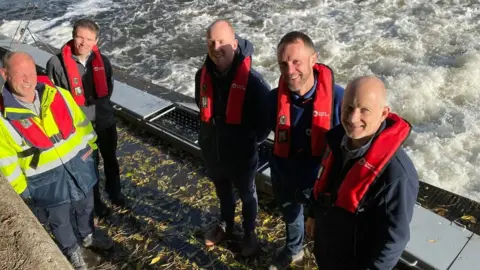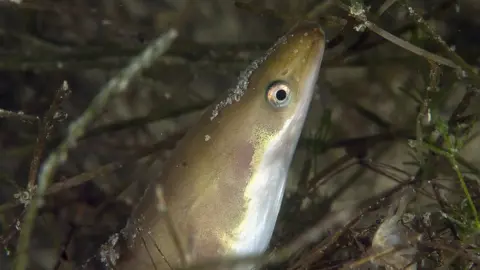Work on £60,000 River Trent eel pass completed
 BBC
BBCA £60,000 pass that will allow eels to make their way up the River Trent has been completed.
The Canal and River Trust and partners helped build the pass to help the endangered species navigate Stoke Bardolph Weir, in Nottinghamshire.
The pass will allow the fish, which are known for making 3,000 mile (4,828 km) journeys between Bermuda and Europe, to make their way over the weir.
The trust described them as a "fascinating species".
'Endangered'
The organisation said the new pass would act like a ladder for the eels.
It forms part of a programme of work under way across Europe to help restore eel populations by removing barriers to the eels' migration routes.
Allan Leather, East Midlands partnerships manager for the trust, said: "I think they're a fascinating species but these days they are much more endangered.
"That's why it's important we work with partners on projects like this."

Wide Sargasso Sea
 Getty Images
Getty Images- The European eel has an extraordinary lifecycle. It starts as an egg in the Sargasso Sea, near Bermuda, on the other side of the Atlantic Ocean and spends 18 months floating on ocean currents towards the coasts of Europe and North Africa.
- Baby eels, known as elvers, enter rivers and lakes and spend anything from five to 20 years feeding and growing into adult eels before returning all the way back to Bermuda to spawn and complete the lifecycle.
- Their amazing transatlantic journey is interrupted only when they come to obstructions, such as manmade dams, weirs and lock gates.
- These barriers are part of the reason that the European eel, once thriving across Europe and the UK, is currently classified as "critically endangered".
- Numbers of eels, which have also been impacted by climate change, destruction of habitats and illegal fishing, have declined by around 90% over the past 40 years.
Source: Canal and River Trust

Richard Bennett, the trust's heritage and environment manager, said: "We're so pleased to give the eels a helping hand as they make their incredible journey.
"Eels are such an important part of what makes our waterways so special.
"They feed on water bugs - helping to recycle nutrients - and are also an important food source for some of our best-loved species such as otters and herons."
Matt Buck, fisheries specialist at the Environment Agency, said: "As well as reopening rivers to fish migration and protecting ecologically important and sometimes endangered species like salmon, shad and eels - fish passes are an amazing opportunity to engage people with the river and reconnect them with the life within it."

Follow BBC East Midlands on Facebook, on Twitter, or on Instagram. Send your story ideas to [email protected].
